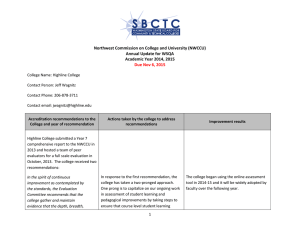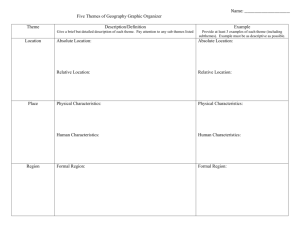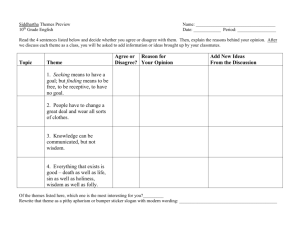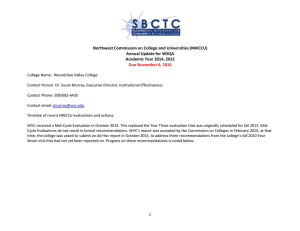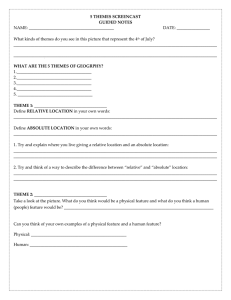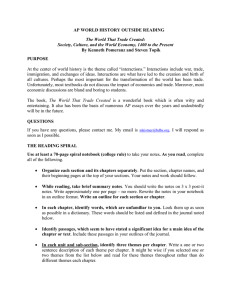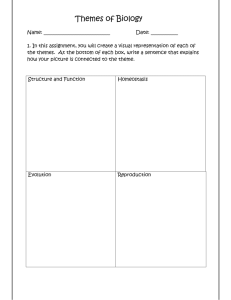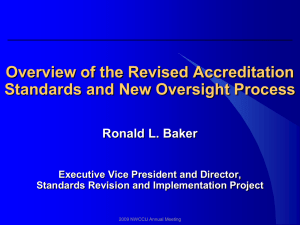Document 11035429
advertisement
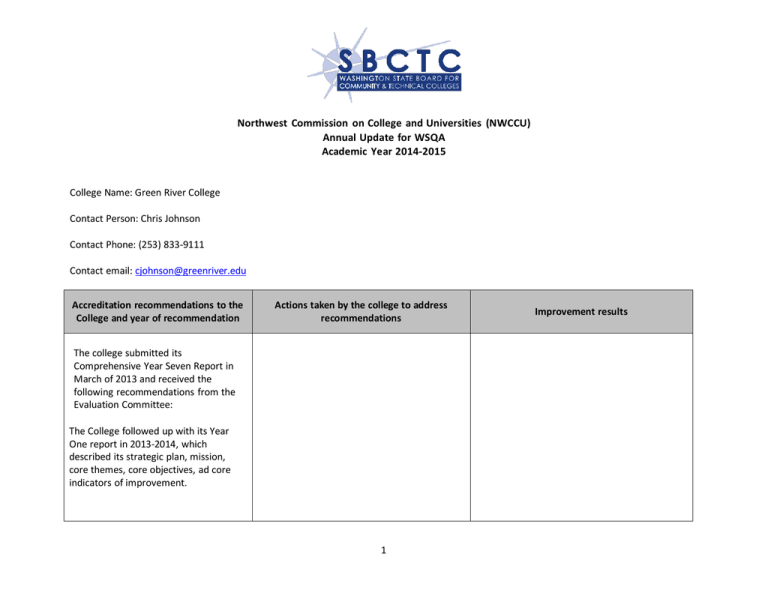
Northwest Commission on College and Universities (NWCCU) Annual Update for WSQA Academic Year 2014-2015 College Name: Green River College Contact Person: Chris Johnson Contact Phone: (253) 833-9111 Contact email: cjohnson@greenriver.edu Accreditation recommendations to the College and year of recommendation Actions taken by the college to address recommendations The college submitted its Comprehensive Year Seven Report in March of 2013 and received the following recommendations from the Evaluation Committee: The College followed up with its Year One report in 2013-2014, which described its strategic plan, mission, core themes, core objectives, ad core indicators of improvement. 1 Improvement results 1. The College ensure the alignment between the mission statement and the core themes – that the core themes “individually manifest” and “collectively encompass” the College mission statement (Standard 1.B.1), that the core theme objectives and verifiable indicators be sufficient to evaluate the accomplishment of core themes (Standard 1.B.2), and that the evaluation of programs and services be holistically informed by indicator data for each core theme objective (Standards 3.B.3 and 4.A.4). 2. The College clarify and operationalize its system of governance with particular attention to communication regarding process and decision-making with all college constituencies (Standard 2.A.1). Standard 1.B.1 has been addressed by defining “comprehensive education” in the mission statement as the four instruction core themes, as well as referencing Revised Code of Washington RCW 28B.50.020. Core theme councils have been conducted yearly review of data and indicators for its core themes by the four core theme councils. Currently evaluation and review of programs is taking place, which will be subsequently reviewed with respect to alignment between program level assessment and core theme level assessment. The college received a Board directive to implement a participatory governance process in 2013-2014. After researching several models, the college implemented a model of constituent councils (i.e., Administrative, Classified, Exempt, & Faculty). Each of the constituent councils send two representatives to the College Council, which serves as a college-wide recommendation body to the Executive Team. 2 These councils are now meeting regularly to make recommendations on college issues. The NWCCU voted to remove this recommendation after submission of the Year One report. 3. The Board review regularly, revise as necessary, and exercise broad oversight of institutional policies (Standard 2.A.7). The Board reviewed all policies Policy Review and Revision as a standing item to the monthly meetings. All policies were revised and/or updated by the Board of Trustees, and a yearly review for currency has been implemented. The NWCCU voted to remove this recommendation after submission of the Year One report. 4. For each year of operation, the College undergo an external financial audit and that the results from such audits, including findings and management letter recommendations, be considered in a timely, appropriate and comprehensive manner by the Board of Trustees (Eligibility Requirement 19 and Standard 2.F.7). The college produced its 2012-2013 Financial Audit statements for review by the Washington State Auditor’s Office (SAO). The SAO completed its field work audit during Fall 2014. The audit for 2012-2013 was completed in June 2015. Two ad hoc reports were submitted to the NWCCU in September 2014 and September 2015. The financial audit for 2013-2014 is scheduled in 2016. 3 The college receives yearly financial audits by the Washington State Auditor’s Office (SAO). NWCCU review of this recommendation is pending in January 2016. 5. The College move aggressively to implement an effective and comprehensive system of direct and authentic assessment that appraises student accomplishment of existing course, program, and college-wide learning outcomes from which are derived meaningful results that provide clear direction for curricular and instructional improvement (Standard 4.A.3, 4.A.6, 4.B.1, and 4.B.2) The Learning Outcomes Committee, with support from the Director of Institutional Assessment, Evaluation, & Analysis, revised the college wide learning outcomes assessment process via pilot assessments of direct student work with the intent of moving towards consistent assessment methods. The Learning Outcomes Committee is now moving towards program level assessment, in which assessment plan templates, technology, and documentation methods will be explored. 4
